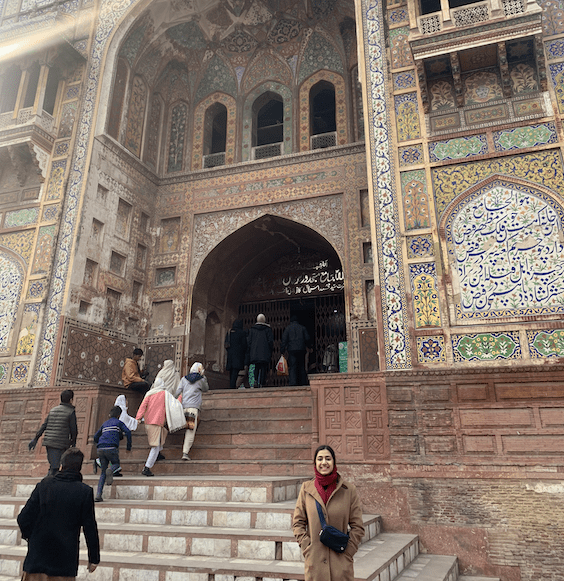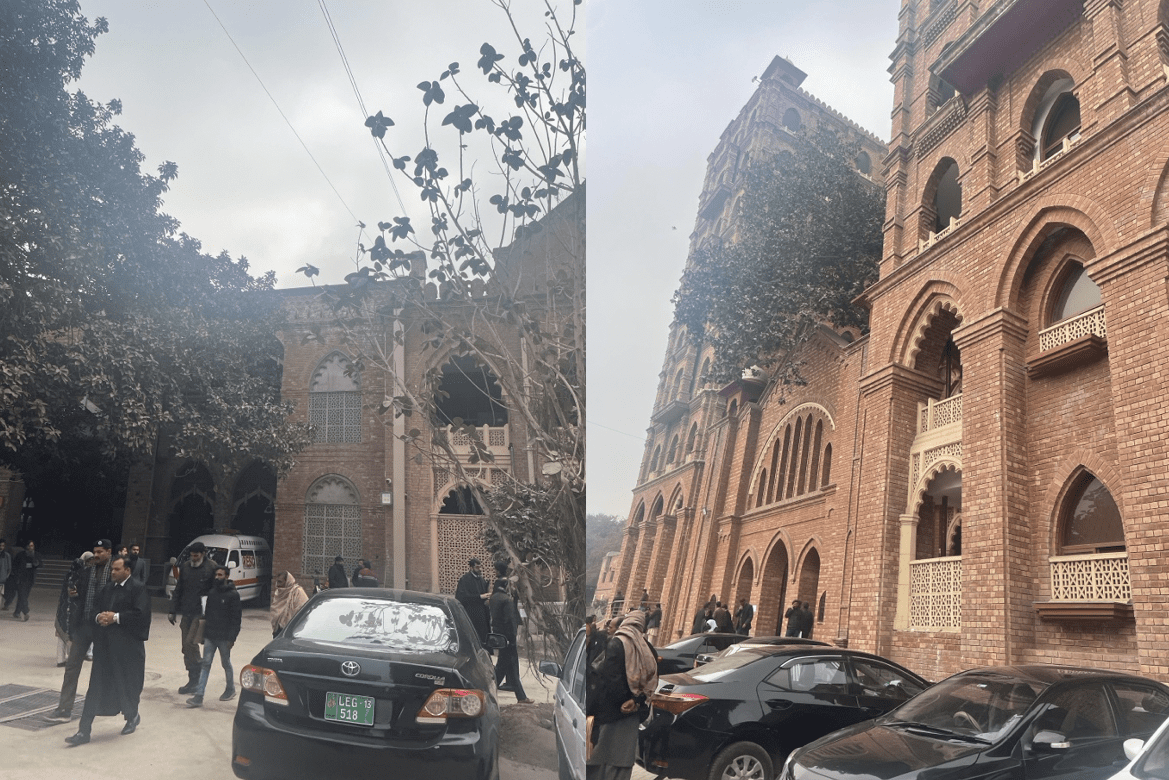Imaan Mirza, a third-year undergraduate concentrating in History and Literature, earned a Mittal Institute student grant to intern in January with AGHS Legal Aid Cell in Pakistan. AGHS is a law firm that provides free legal representation to the vulnerable and fights for human rights for the disenfranchised. During Imaan’s three-week internship, she completed legal research, legal drafting, and administrative tasks – read on for more about her three-week experience.
Mittal Institute: Imaan, congratulations on your winter student grant! What were your goals with this grant, and why did you pursue this project/location?
Imaan Mirza:I was thrilled to use my Mittal grant to support my winter break trip to Lahore, Pakistan, where I spent my time interning with AGHS Legal Aid Cell, the country’s leading human rights advocacy group that delivers free legal support for low-income Pakistanis from vulnerable communities. In this role, I had the special opportunity to explore Pakistan’s legal system, with a special focus on the country’s family laws: an intellectual interest I’ve explored both in the classroom and in professional settings.
During my three-week internship, I completed legal research, legal drafting, and administrative tasks. I was amazed by the wide range of assignments and opportunities given to me as an intern. In my last week of work, I even had the opportunity to visit the Lahore High Court and observe the fascinating courtroom dynamics! Lastly, I attended a prosecutor’s training, led by AGHS Legal Aid Cell, designed to discuss newly developed items of anti-rape legislation.

Imaan says: “While in old Lahore, I also stopped by the Wazeer Khan Mosque, a beautiful and recently-restored space. I had the opportunity to perform my afternoon prayers against the backdrop of the beautiful architecture.”
Mittal Institute: Tell us what is most impactful about this experience?
Imaan Mirza: During the anti-rape legislation prosectutor’s training, I specifically learned how expanding the definition of rape could generate vastly different legal outcomes for survivors, if understood and used correctly by prosecutors. The intellectual exercise of understanding how the new legislation functions and its vast implications was incredibly stimulating and only whetted my appetite for a career in law!
Mittal Institute: Bring us into your daily life during your grant? What was it like? Who were you meeting? What institutions were you visiting?
Imaan Mirza: As an intern, one of my projects included compiling a series of reports on both media-reported and police-reported instances of violence against women. This process included searching through online, publicly available police databases, for each province, and consolidating it alongside media reports of such violence. The project felt meaningful — very few materials like this exist online. It was also interesting identifying the differences between media-reported numbers and the numbers posted by the provincial police departments.
For most of my other assignments at AGHS, I delved deep into legal research. Research tasks offered me rich insights into Pakistani family laws and the opportunity to indirectly serve the clients of AGHS by identifying the legal judgements most germane to their cases. For a few days, for instance, I worked with another intern to research the conditions under which the man must pay the dower to his wife. I was also asked to look into if and how a Court should give interim maintenance in the event of the dissolution of a marriage between two Christians. To answer this research question, I looked for the most relevant items of case law under the Divorce Act of 1864, a law that uniquely applies to Christian Pakistanis.
In addition to legal research, I also had the opportunity to practice legal drafting — a rare opportunity for an undergraduate! Under the supervision of one of the firm’s lawyers, who very generously showed me the ropes of legal drafting, I completed a suit for the maintenance of a mother and her minor child.

Imaan says: “The High Court pictured above. As you can see, lawyers in Pakistan are required to dress in black and white uniform when appearing in court and representing a client. I was also asked to wear a uniform the day that I joined Maryam Najam Uddin.”
Mittal Institute: What’s the most memorable moment from your time on the student grant?
Imaan Mirza: Touring Old Lahore, and observing the strange yet lovely syncretism of colonial and Mughal architectural styles, was definitely a personal highlight for me. Growing up, I never really had the opportunity to “play the tourist” in Lahore, nor did I have any desire to do so — I was perfectly content playing with my cousins in our grandparents’ house. Now, at the age of 22, I was very keen on exploring Lahore this winter and studying the city’s fascinating history. Asmer Asrar Safi (Harvard College ’24) is from Lahore and very generously reprised the role of my personal tour guide throughout my time in the city, showing me all of the gems and regaling me with their histories, such as the Badshahi Mosque and the Lahore Fort Food Street.

Imaan says: “I wandered around an old book bazaar on Mall Road that is only open on Sundays! I found some gems, including a 1982 cricket magazine that describes Imran Khan’s “exta-vagant good looks” and his “patrician” manner. I also found a copy of “A Suitable Boy,” a book that I read for my History & Literature tutorial with Vikrant Dadawala.”

Imaan says: “Right by the old book bazaar was (very fittingly) the Pak Tea House, an iconic meeting ground for progressive Pakistani intellectuals and writers.”
Mittal Institute: How do you think this internship experience will help you reach your academic goals?
Imaan Mirza: This internship was incredibly meaningful for three important reasons: first, it offered me invaluable exposure to family law advocacy in the international context, the kind of work that perfectly complements the Comparative Family Law class in which I am currently enrolled (and about which I hope to write my senior thesis!) Second, it was thrilling to get to see the behind-the-scenes work of a group like AGHS, whose work I both greatly admire and hope to pursue one day, following my graduation from Harvard. And finally, it was lovely to get to know Lahore better, a city that felt equally as new and exciting as it did familiar. I’m so very thankful to the Mittal Institute for supporting this incredible opportunity and would encourage other students to apply for the winter grant!
☆ The views represented herein are those of the interview subjects and do not necessarily reflect the views of LMSAI, its staff, or its steering committee.
